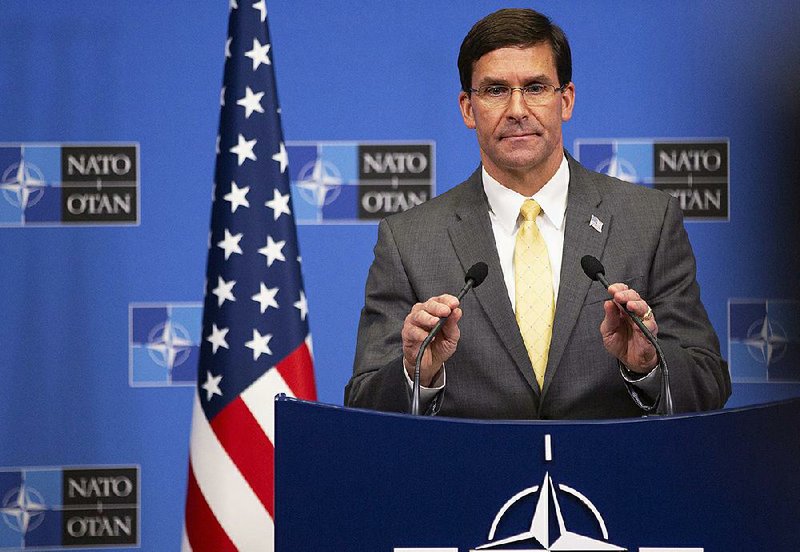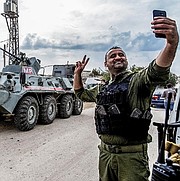BRUSSELS -- Defense Secretary Mark Esper said Friday that the United States would leave forces in Syria to protect oil fields and keep them from falling into the hands of Islamic State militants.
The announcement marked a partial reversal of President Donald Trump's speedy withdrawal from Syria, and it capped a meeting of NATO defense ministers that showcased intense anger among some alliance members toward Turkey for its decision to send troops into Syria.
The move came a day after Trump said the United States would prevent the Islamic State from regaining control of oil fields in eastern Syria and signaled an increasing U.S. focus on Syrian energy assets.
"We are also considering how we might reposition forces in the area in order to make sure that we secure the oil fields," Esper said. "We are now taking some actions. I'm not going to get into the details."
[Video not showing up above? Click here to watch » https://www.youtube.com/watch?v=gh6h3bXFEGs]
He said the U.S. deployment "would include some mechanized forces," but he declined to comment on reports that the Pentagon's plans include the possibility of tanks or other armored vehicles and support personnel. The purpose of the troop repositioning is to "ensure that we can deny ISIS access to the oil fields," he said, using an acronym for the Islamic State group.
Esper said the overall U.S. withdrawal from Syria would continue.
The troops would remain in the eastern Syrian province of Deir al-Zour, where the United States has maintained a base, Esper said. He said the U.S. military remains in close contact with the Syrian Kurdish forces that it has long assisted.
Esper's announcement came a day after Trump said on Twitter that "we will NEVER let a reconstituted ISIS have those fields!"
"Perhaps it is time for the Kurds to start heading to the Oil Region!" he added.
Speaking to reporters Friday at the White House, Trump said the U.S.-brokered agreement with Turkey to halt its offensive against the Syrian Kurdish fighters was a win for his administration. That offensive began after Trump announced that U.S. troops would not stand in the way, though he also said the U.S. would punish Turkey's economy if the country acted inhumanely.
He also said anew on Friday that "we're getting our troops out" of Syria, without mentioning Esper's announcement.
"We are doing well in Syria, with Turkey and everybody else that we're dealing with," Trump said. "We have secured the oil. ... We have a couple of people that came knocking, we said 'don't knock.' And I think I would say that things are going very well."
White House officials would not clarify whom he was referring to as "knocking."
The shift to protecting oil fields also could raise issues in Congress.
The Pentagon is operating in Syria under the long-standing Authorization for Use of Military Force passed by lawmakers in the wake of terrorist attacks in September 2001 to target "nations, organizations, or persons" who were involved and to prevent "future acts of international terrorism."
While the Obama and Trump administrations have argued that allows action against the Islamic State group, there are concerns that the Syrian regime or forces aligned with it also could want the oil fields. In February 2018, U.S. forces said they used airstrikes and artillery to kill more than 100 advancing Syrian forces in the same area after commanders determined that U.S. troops on the ground were in danger.
Esper was pressed repeatedly at a news conference in Brussels for more specifics about whether the plans included tanks and about how many troops would remain deployed around the oil fields, but he declined to offer more details.
One U.S. official, speaking before Esper's announcement, said an operation to secure oil fields would probably require about a company of U.S. troops at the outset, including some 200 service members, several tanks and supporting equipment.
The details would be decided based on what equipment is already in the theater, said the official, who spoke on the condition on anonymity because of the sensitivity of the situation.
SECURITY FEARS
The announcement capped two days of discussions at NATO headquarters in Brussels that were dominated by anger at the invasion of Syria by Turkey, a fellow NATO member. One after another, defense ministers castigated Turkish officials for a move that many said risked undermining European security by destabilizing northeastern Syria. Turkish forces invaded Syria to push back U.S.-allied Syrian Kurdish fighting groups that Ankara says pose a security threat to Turkey.
The Kurds played a leading role in pushing the Islamic State group out of its territory in the region, and more recently they had been operating prison camps in which former Islamic State fighters and families were held. The Turkish incursion has led to prison escapes and fears of a renewed terrorism threat to Europe.
Esper said Friday that Turkish Defense Minister Hulusi Akar informed him that Turkey has regained control of at least some purported Islamic State detainees in Syria who escaped.
A spokeswoman for the Turkish mission to NATO did not immediately respond to a call for comment.
Turkey's agreement this week with Russia to jointly send in troops to the region to fill the vacuum created by the U.S. withdrawal also has caused concern at NATO, an alliance that spends much of its energy countering threats from the Kremlin. European countries fearful of a Russian security risk on their borders dislike that an ally, Turkey, is making security deals with Russia elsewhere in the world.
"These are disagreements on a very serious situation in northeast Syria," said NATO Secretary-General Jens Stoltenberg.
Many NATO policymakers fear the instability in Syria has been a gift to Russia. The upheaval in northern Syria has strengthened Russia's position in the Middle East at a time when European nations have voiced concern that a resurgent Russia could threaten their security.
"We are not very enthusiastic when we see Russians on former U.S. bases," said Lithuanian Defense Minister Raimundas Karoblis. "The alliance should not give gifts to a strategic competitor."
MORE RUSSIANS
Meanwhile, Russia has sent hundreds of additional troops to Syria to help patrol the country's Turkey-Syria border in line with the deal between Moscow and Ankara, the Russian Defense Ministry said Friday.
The ministry said about 300 military police arrived in Syria to patrol the northeastern areas along the border with Turkey and oversee the pullout of Syrian Kurdish fighters from there. Military cargo planes also airlifted 20 armored vehicles for the mission, it added.
Turkey has now been allowed to keep control over a significant chunk of northeastern Syria, a belt of land on its border in the northeast that it invaded on Oct. 9, along with a larger piece of the border in the northwest that Turkey already holds, captured in previous incursions.
Russia said Friday that the additional battalion of military police dispatched to Syria is from Chechnya. Troops from Chechnya, known for their fierce warrior spirit, have regularly been sent to Syria on rotation bases in recent years.
The Russian military did not release the total number of its contingent in Syria, and it did not say Friday how many troops will be involved in the patrol mission on the Turkish border.
Under the Moscow-Ankara deal, Turkey is to keep sole control of a large section in the center of the border area, most of which was captured in its invasion this month, aimed at driving the U.S.-allied Kurdish forces out of a "safe zone" along the border.
Syrian government and Russian military police are to control the rest of the 273-mile Syria-Turkey border. They are to ensure that Syrian Kurdish fighters pull 19 miles away from the frontier. After that, Russia and Turkey are to begin joint patrols along a narrower strip directly on the Turkish-Syrian border.
Kremlin spokesman Dmitry Peskov said the Russian military has been in close contact with the Syrian Kurdish fighters, doing a "delicate job" of coordinating their pullout from the border areas. He noted that the Kurds have pledged to abide by the deal, adding that the failure to do so would put them in trouble.
"If the Kurdish units with their weapons aren't pulled back from that zone, they will regrettably be left face to face with the Turkish military because [Syrian] border guards and Russian military police wouldn't stand between them," Peskov said in a conference call with reporters.
Information for this article was contributed by Michael Birnbaum, Missy Ryan and Dan Lamothe of The Washington Post; and by Vladimir Isachenkov, Lolita C. Baldor, Robert Burns and Aamer Madhani of The Associated Press.
A Section on 10/26/2019


